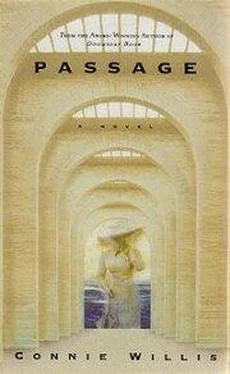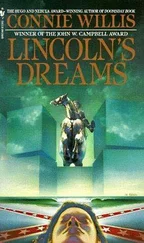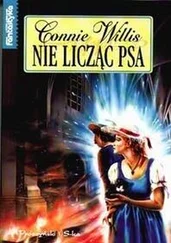“Drowning’s the worst way to die,” Vielle had said, but they were all terrible. Heart attack and kidney failure and beheading, drug overdoses and nicked aortas and being crushed by a falling smokestack. Joanna looked up, trying to see the Titanic, but there was only water above her. And darkness.
She reached up for the surface, but it was too far above her, and after a while she let her arms fall, and she fell. Her hair fanned out around her like Amelia Tanaka’s had, lying on the examining table, her dead hands drifting limp and open in the dark water.
I let go of the French bulldog, she thought, and knew that she could not have held on to him or onto his memory, or onto the memory of Ulla or the dog at Pompeii, struggling against its chain, or of the Titanic passenger letting the dogs out of their cages, because the falling was itself a letting go, and as she fell, she forgot not only the dog but the meaning of the word dog and of sugar and sorrow.
They fell away from her like snow, like ash, memories of saying, “Can you be more specific?” and eating buttered popcorn, of standing in the third-floor walkway, looking out at the fog, and sitting next to Mrs. Woollam’s bed, listening to her read passages from the Bible, “When thou passest through the waters, I will be with thee,” and “Rosabelle, remember,” and “Put your hands on my shoulders and don’t struggle.”
Names fell away from her in drifting tatters, the names of her patients and of her best friend in third grade, of the movie star Vielle’s police officer had looked like and the capital of Wyoming. The names of the neurotransmitters and the days of the week and the core elements of the NDE.
The tunnel, she thought, trying to remember them, and the light, and the one Mr.—what was his name?—she had forgotten—was so insistent about. The life review. “There’s supposed to be a life review,” he had said, but he was wrong. It was not a review but a jettisoning, events and happenings and knowledge being tossed overboard one by one: numbers and dates and faces, the taste of Tater Torros, and the smell of crayons, Indian red and gold and sea green, the combination of her junior high locker and her Blockbuster password and the best way to get from Medicine to ICU.
Code alarms and Victory gardens and scraping snow off her windshield, and somewhere a fire, burning out of control, sending up billows of black acrid smoke. And the smell of fresh paint, the sound of Amelia Tanaka’s voice, saying, “I was in a tunnel.” A tunnel, Joanna thought, looking down at the water she was sinking into, the narrowing darkness.
But there was no light at the end of this tunnel, and no angels, no loved ones, and even if there were, she would have forgotten them, fathers and grandmothers and Candy Simons. Would have left the memory of all of them, relatives and friends, living and dead, behind in the water. Guadalupe and Coleridge and Julia Roberts. Ricky Inman and Mrs. Haighton and Lavoisier.
She had been falling a very long time. I can’t fall forever, she thought. The Titanic hadn’t fallen forever. It had come finally down to the bottom of the sea and settled into the soft mud, surrounded by chamber pots and chandeliers and shoes.
Will I be surrounded by shoes, too? she wondered, and could see them in the darkness: the red tennis shoe, jammed in the door, and Emmett Kelly’s huge, flapping clown shoes and the tiny shoe in the Monopoly game, and the abandoned shoes of the sailors, lined up along the deck of the Yorktown. The Yorktown had come to rest, too, and the Lusitania and the Hindenburg, and Jay Yates and Lorraine Allison and Little Miss 1565, having forgotten everything, even their names. Rest in peace.
What was the Latin for “Rest in peace”? “ Eloi, eloi, lama sabacthani,” she thought, but that wasn’t right. That was the Latin for something else. She had forgotten the Latin for “Rest in peace” and the words to “Nearer, My God, to Thee” and “The Wreck of the Hesperus” and “The Sound of Music.”
Everything she had learned by heart fell away from her, line after line, unraveling into the dark water like tape from a broken Blockbuster video, “The Assyrian came down like the wolf on the fold,” and “At a time like this, it’s every man for himself.” “Houston, we have a problem,” and “Oh, don’t you remember, a long time ago, there were two little children whose names I don’t know.”
The words trailed away into the water, carrying memory with them, of trailing electrode wires and lifejacket ties and yellow “Do Not Cross” tape. And yellow afghan yarn, yellow sneakers like the ones Whoopi Goldberg wore in Jumpin’ Jack Flash, Jack in the Beanstalk, Jack Phillips.
And that was important. There was something important about Jack Phillips. Something about a lab coat, or a blanket. Or a heater, shutting off. They’re shutting off, she thought, the receptors and transmitters and neurons, and this is just a symbol for it, a… but she had forgotten the word for metaphor. And for disaster. And for death.
Had forgotten the taste of Cheetos and the color of blood and the number fifty-eight, forgotten Mercy General and mercy everlasting, zeppelins and kissing, her dress size, her first apartment, where she’d put her car keys, the answer to number fifteen on Mr. Briarley’s final, the sound in the tunnel and her 1040 form.
My taxes. I didn’t send in my 1040. They’re due April fifteenth, she thought, and remembered that the Titanic had gone down on the night of the fourteenth. All those people, she thought, they didn’t file their income tax returns either. No, that was wrong. They didn’t have income tax back then. That was why they were all so rich. But there were other things they hadn’t done that they had intended to do: meet friends at the dock in New York, send a telegram announcing their safe arrival, marry, have children, win the Nobel Prize.
I never learned to play the piano, Joanna thought. I didn’t tell Mr. Wojakowski we couldn’t use him in the project, and now he’ll pester Richard. I didn’t transcribe Mr. Sage’s NDE.
It doesn’t matter, she thought. But I didn’t pay the gas bill, she thought. I forgot to water my Swedish ivy. I didn’t get the book from Kit. I promised I’d go pick it up. I promised I’d go see Maisie.
Maisie! she thought in horror. I didn’t tell Richard, I have to tell him, but could not remember what it was she had wanted to tell him. Something about the Titanic. No, not the Titanic. Mr. Briarley had been wrong, it wasn’t about the Titanic. It was something about Indians. And the Rio Grande. And a dog. Something about a dog.
No, that wasn’t right either. Fog, she thought, and remembered standing in the walkway, looking out at fog. It was cold and diffuse, like the water, like death. It blotted out everything, memory and duty and desire. Let it go, she thought, staring at nothingness. It’s not important. Let it go.
Progress reports and delivering the mail and regret. They aren’t important. Nothing’s important. Not proving it’s the Titanic or having a hall pass or avoiding Mr. Mandrake. None of it matters. Not Mr. Wojakowski or Mrs. Haighton’s never returning my calls or Maisie.
That’s a lie, she thought. Maisie does matter. I have to find Richard. I have to tell him. “Richard, listen,” she cried, but her mouth, her throat, her lungs, were full of water.
She kicked frantically, reaching up with her cupped hands, her arms. I have to tell him, she thought, clutching at the water as if it were the railing of a staircase, trying to pull herself up hand over hand. I have to get the message through. For Maisie.
Читать дальше












